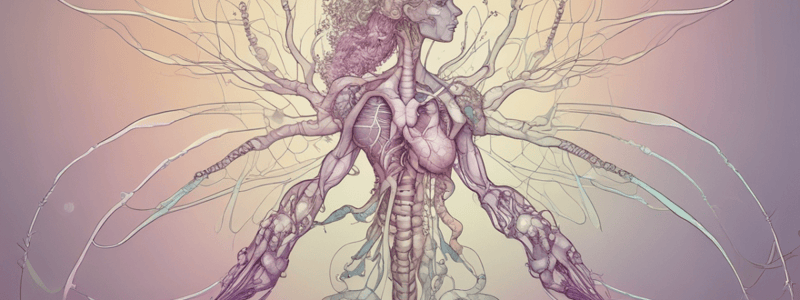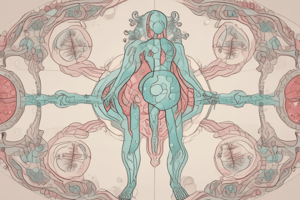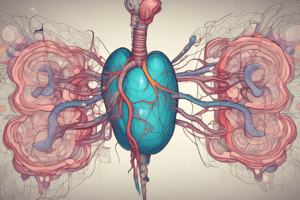Podcast
Questions and Answers
What is the karyotype associated with Turner's Syndrome?
What is the karyotype associated with Turner's Syndrome?
- 47 (XXY)
- 45 (X0) (correct)
- 46 (XY)
- 46 (XX)
Which of the following is a common feature of Turner's Syndrome?
Which of the following is a common feature of Turner's Syndrome?
- High set ears
- Lymphodema (correct)
- Hypergonadism
- Tall stature
What is the primary genetic cause of Testicular Feminisation (AIS)?
What is the primary genetic cause of Testicular Feminisation (AIS)?
- Various genetic mutations on the X chromosome (correct)
- Trisomy 21
- Mutations in the SRY gene
- 45 (XO) karyotype
Which of the following is NOT a pituitary or hypothalamic cause of abnormal menstruation and infertility?
Which of the following is NOT a pituitary or hypothalamic cause of abnormal menstruation and infertility?
What is a possible ovarian cause of abnormal menstruation and infertility?
What is a possible ovarian cause of abnormal menstruation and infertility?
What stages show the highest hormonal activity?
What stages show the highest hormonal activity?
What is the primary production site of follicle-stimulating hormone (FSH) and luteinising hormone (LH)?
What is the primary production site of follicle-stimulating hormone (FSH) and luteinising hormone (LH)?
How does oestrogen affect FSH and LH levels in women?
How does oestrogen affect FSH and LH levels in women?
Which hormone primarily increases plasma protein concentration?
Which hormone primarily increases plasma protein concentration?
What is the molecular weight of FSH?
What is the molecular weight of FSH?
Which compound is the first step in steroidogenesis?
Which compound is the first step in steroidogenesis?
Which of the following is a clinical presentation of female gonadal dysfunction?
Which of the following is a clinical presentation of female gonadal dysfunction?
What hormone stimulates the maturation of a single ovarian follicle?
What hormone stimulates the maturation of a single ovarian follicle?
What hormone is released mid-cycle that triggers ovulation?
What hormone is released mid-cycle that triggers ovulation?
What hormone is secreted by the corpus luteum?
What hormone is secreted by the corpus luteum?
What happens if implantation does not occur during the menstrual cycle?
What happens if implantation does not occur during the menstrual cycle?
Which hormone shows a peak level shortly after Day 14 of the menstrual cycle?
Which hormone shows a peak level shortly after Day 14 of the menstrual cycle?
What hormonal change marks ovulation on Day 14?
What hormonal change marks ovulation on Day 14?
Which clinical presentation is associated with excessive hair growth?
Which clinical presentation is associated with excessive hair growth?
Which hormone is commonly associated with amenorrhea in the context of weight-related issues?
Which hormone is commonly associated with amenorrhea in the context of weight-related issues?
In the case of primary amenorrhea, what percentage is attributed to hypogonadotrophic hypogonadism?
In the case of primary amenorrhea, what percentage is attributed to hypogonadotrophic hypogonadism?
Which of the following is NOT a cause of hypogonadotrophic primary amenorrhea?
Which of the following is NOT a cause of hypogonadotrophic primary amenorrhea?
Which test is used for assessing dynamic function of the female reproductive system?
Which test is used for assessing dynamic function of the female reproductive system?
Which condition is characterized by raised LH and FSH levels in primary amenorrhea?
Which condition is characterized by raised LH and FSH levels in primary amenorrhea?
Which of these is a common cause of secondary amenorrhea in non-pregnant women?
Which of these is a common cause of secondary amenorrhea in non-pregnant women?
What is a characteristic of hypothalamic secondary amenorrhea?
What is a characteristic of hypothalamic secondary amenorrhea?
Which condition is associated with a 17% cause of primary amenorrhea?
Which condition is associated with a 17% cause of primary amenorrhea?
What is the most common cause of secondary amenorrhoea?
What is the most common cause of secondary amenorrhoea?
Which of the following is not a common presentation of Polycystic Ovary Syndrome (PCOS)?
Which of the following is not a common presentation of Polycystic Ovary Syndrome (PCOS)?
What is the incidence range of Congenital Adrenal Hyperplasia (CAH)?
What is the incidence range of Congenital Adrenal Hyperplasia (CAH)?
Which enzyme deficiency is commonly associated with Congenital Adrenal Hyperplasia (CAH)?
Which enzyme deficiency is commonly associated with Congenital Adrenal Hyperplasia (CAH)?
Which diagnostic marker is indicative of Congenital Adrenal Hyperplasia (CAH)?
Which diagnostic marker is indicative of Congenital Adrenal Hyperplasia (CAH)?
Which of the following is a symptom of Congenital Adrenal Hyperplasia (CAH)?
Which of the following is a symptom of Congenital Adrenal Hyperplasia (CAH)?
Which of the following is not a cause of hirsutism?
Which of the following is not a cause of hirsutism?
Which of the following conditions typically involves early development of secondary sexual characteristics?
Which of the following conditions typically involves early development of secondary sexual characteristics?
Study Notes
Reference Ranges (FSH and LH)
- Reference ranges for FSH and LH hormones change according to developmental stage
- Highest hormonal activity occurs at puberty, during the Tanner stage
- In adults, hormonal levels remain stable in males and reflect the menstrual stage in females
FSH and LH
- FSH (Follicle Stimulating Hormone) and LH (Luteinising Hormone) are glycoproteins produced by gonadotrophic cells of the anterior pituitary
- FSH has a molecular weight of 34 kDa, while LH has a molecular weight of 28.5 kDa
- Both hormones are under the influence of GnRH (pulsatile)
Oestrogen
- Oestrogen is a steroid sex hormone with beneficial effects on bone mass
- Oestrogen increases levels of HDL and VHDL, and plasma protein concentration
- Oestrogen binds to proteins such as SHBG, Corticosteroid BG, and Thyroxine BG
Steroidogenesis
- FSH and LH stimulate the production of oestrogens, which in turn suppress FSH in both sexes
- Oestrogens stimulate LH production in women but suppress LH in men
- Inhibin release causes negative feedback suppression of FSH in both sexes
- Activin has the opposite action, stimulating FSH production
- The steroidogenesis pathway involves 12 steps:
-
- Cholesterol
-
- Pregnenolone
-
- 17a hydroxypregnenolone
-
- Dehydroepiandrosterone
-
- Progesterone
-
- 17a hydroxyprogesterone
-
- Androstenedione
-
- 11 deoxycortisol
-
- Testosterone
-
- Cortisol
-
- Aldosterone
-
- Oestradiol
-
Female Gonadal Dysfunction
- Clinical presentations of female gonadal dysfunction include:
- Menstrual disturbances (Oligomenorrhoea / Amenorrhea)
- Infertility
- Hirsutism / Virilism
- Vasomotor Instability / Mood swings
- Galactorrhoea
- A combination of the above
- Complications of pregnancy
Menstrual Cycle
- The menstrual cycle consists of 2 stages: Follicular and Luteal
- The Follicular stage involves:
- FSH stimulating the maturation of a single ovarian follicle
- Ripening follicle secreting Inhibin and E2
- LH surge and ovulation
- Ovum enters fallopian tube
- Remaining cells form the corpus luteum
- The Luteal stage involves:
- Corpus luteum secreting progesterone
- If implantation does not occur, progesterone secretion falls
- Cycle begins again
Turner's Syndrome
- Karyotype 45 (X0)
- Occurs in 1:2500-3000 live births
- Characteristics include:
- Lymphodema
- Short stature
- Hypogonadism
- Low set ears
- Webbed neck
- Skeletal abnormalities
- Heart murmur
Testicular Feminisation (AIS)
- Characterized by XY chromosome (male genotype) and androgen insensitivity syndrome (AIS)
- Occurs in 1:20,000 live births
- Can be complete or incomplete, resulting in varying degrees of sexual ambiguity
Studying That Suits You
Use AI to generate personalized quizzes and flashcards to suit your learning preferences.
Description
Learn about the reference ranges for FSH and LH hormones, how they change according to developmental stage, and their hormonal activity during puberty and adulthood. Understand the role of these glycoproteins produced by the anterior pituitary.




